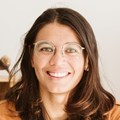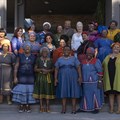Funda Wande is a not-for-profit organisation that aims to equip teachers to teach reading-for-meaning and calculating-with-confidence in Grades R-3 in South Africa. Led by CEO and education thought leader Nangamso Mtsatse, Funda Wande is a beneficiary of the Allan Gray Foundation.

Nangamso Mtsatse, CEO of Funda Wande
Before being appointed CEO, Mtsatse's previous portfolios included being Funda Wande’s versioning and relationships lead and more recently head of literacy. She is also completing her PhD in Education Policy at Stellenbosch University and is an affiliated researcher at the Research on Socioeconomic Policy (RESEP) group.
Mtsatse shared with us more about Funda Wande's work in the education sector, how it persevered through the pandemic, and some of the major challenges and opportunities that lie ahead.
Tell us a bit about yourself and your background.
I am Nangamso Mtsatse, born and bred in Gqeberha, former eBhayi. My schooling experience really opened my eyes to the bimodality and inequality of education. It was evident to me that there was a difference in education experiences between the friends I spent time with after school in the township versus my peers at my former-model C school. Although, at the time, I did not think I would end up in education.
I was offered a Human Movement & Sports Science bursary at UP, which I took with open hands because, at the time, my parents could not afford the full varsity fees. The bursary came with the condition that I play hockey for the varsity team.
Being young and impulsive, and as someone who had previously played at provincial level, I was not too impressed that I made the ninth team so I decided to quit hockey completely. This also came with many negative experiences I had being a Black girl playing a White-dominated sport. It almost felt like the varsity experience was the final straw for me with hockey.
But then I needed to explain to my parents how I had lost my scholarship and what my plan was. At the time, Fundza Lushaka bursary was still accepting applications, and I was looking for a course that would not hold me back in terms of “university years” but one that would enable me to transfer some of the modules I had already been doing – education was it!
After second-year practicals in a high school back home, I was even more convinced that this is what I wanted to do and it resonated with my upbringing and some of the things I always saw as social injustice. From my undergraduate, I continued to study further whilst lecturing and being involved in large-scale studies like the Nuffield and PIRLS.
Working in academia taught me a lot about professionalism, networking and building my confidence in expressing myself.
I always knew that I would not be in academia for a long time. I wanted to use the opportunity to ground myself in research and understand the nuts and bolts of early-grade reading. Having studied education, I knew that I wanted to make a difference in the classroom and marry the research I had been doing with practical solutions that could take off on the ground.
Share with us more about Funda Wande's work in the education sector.
Funda Wande is a not-for-profit organisation which focuses on improving early-grade reading and mathematics outcomes in South Africa. Our goal is for all children to be able to read for meaning and calculate with confidence by the age of 10 by 2030.
We do this by creating high-quality materials and experimenting with different teacher training approaches with an eye for scale. Our materials and training are created in the home languages that children speak and understand and are freely available for anyone to download and use. Our programmes and materials are all evidence-based, independently evaluated, policy-aligned and cost-effective.
How did the NPO persevere through the pandemic?
I think that the pandemic was extremely difficult for anyone and everyone who was working closely with schools, particularly with teachers and learners. We needed to be quite agile and responsive because schools were closed for the most part of 2020 and even when learners returned to school in 2021, they were on a rotational timetable meaning that they only received between 50% to 65% of normal learning time.
We developed two programmes - a reading academy, using the opportunity while teachers were at home to develop a 40-hour online course on the teaching of African languages in foundation phase. The second thing we did was to develop at-home workbooks and sheets with simple, straightforward instructions which learners could complete and parents themselves could assist.
We had set up WhatsApp groups with parents, giving them daily guidance on how to assist their children in completing the workbooks. I must admit this was very challenging as we do not have a strong focus on edtech. Typically, the schools that we work in either have limited internet connection or the cost of data is usually a challenge for both teachers, learners and parents.
However, it was very interesting and exciting that both teachers and parents were quite open in continuing some level of structured learning for their learners or their children.
The reading academy has been extremely successful and is now being rolled out to the Western Cape and Eastern Cape. About 2,000 teachers so far have been trained by their provinces on the reading academy.
What has been the measureable impact of Funda Wande so far?
In 2019, we were excited to see a shift in literacy outcomes from our Eastern Cape (EC) coaching intervention on par with the Department of Basic Education’s Early Grade Reading Study (DBE’s EGRS). At that time, the EGRS represented the most successful within-class literacy intervention seen in South African schools. The EGRS was found to shift literacy outcomes by 0.19 standard deviations (SD) in the first year, while our EC coaching intervention shifted literacy outcomes by 0.17 SD.
With Covid, no further shifts in literacy were observed in 2020, while control schools showed a decline. By the end of 2021, after two years of the pandemic, the treatment literacy outcomes were again on par with those seen in control schools and any progress made in 2019 was eroded during the pandemic. However, in 2021 we implemented a workbook programme in the Eastern Cape for literacy and numeracy, also with coaches. Although this intervention did not see the same success as the lesson plan intervention in 2019 (pre-pandemic), it did exceed the lesson plan intervention outcomes seen in 2021, especially on higher-order literacy skills, with similar outcomes for numeracy.
Taken together, these results indicate that coaches and lesson plans, while effective in shifting outcomes in non-pandemic times, are not enough to shift literacy outcomes amid school closures and rotational timetables. However, workbooks are effective for some literacy and numeracy domains, even with minimal content coverage.
In addition, in 2021, we implemented the workbook programme in Limpopo with teacher assistants (TA) to directly support teachers, rather than provide coaches. An independent evaluation found that learners in Funda Wande schools with teacher assistants outperform their peers in control schools by 0.45 SD in reading, 0.22 SD in early numeracy and 0.38 SD in the written Early Grade Maths Assessment (EGMA).
In comparison with other programmes, namely the EGRS and our own coaching programme in the Eastern Cape, the effect size of the TA intervention is two to three times higher. Further, whilst the EGRS focused only on literacy, the Limpopo intervention focuses on both literacy (Funda Wande) and numeracy (Bala Wande) and was effective in improving learner results for both. There are no other known within-school interventions in South Africa which have been shown to shift learning outcomes to the same extent in literacy, or current programmes that target both literacy and mathematics in the same schools (GPLMS was the last programme to jointly target literacy and numeracy).
This is particularly exciting given what we learnt from the Eastern Cape intervention – namely that workbooks and coaches are not enough to substantially shift literacy and numeracy outcomes across all evaluated domains during pandemic times as there was substantially less support during this period. For example, during Covid-19, teachers received only four days per term of centralised training instead of seven days pre-pandemic, and two one-on-one teacher coach support visits per term as opposed to four visits. It seems the combination of workbooks and teacher assistants are more effective and, amidst school closures and rotational timetables, not only met the pre-pandemic standard, but far exceeded it.
As a thought leader in the NPO space, what do you see as the major challenges and opportunities ahead?
One of the challenges that we see in the NPO space is in education and a lack of coordination of all efforts. There are multiple people and multiple organisations that are doing incredible work and it is unclear to me how government and funders are engaging with these organisations. Alternatively, as NPOs, we should be coordinating our efforts to reduce duplication in a time when resources are limited.
Another challenge that we have in the education NPO space is the tension around different approaches.
My view is that we should be working closer in improving learning outcomes in the country rather than competing or debating about approaches in getting there.
Like many things, we all share a common goal and that is to get all children in SA reading for meaning and calculating with confidence by 2030.
Our job as a silver society is to experiment with sustainable solutions that government can take up because at the end of the day, government is the institution that spends the most money in South Africa on education.
A serious opportunity coming up within the NPO or education space is the teacher retirement wave. There has been research done recently which says that currently more than 65% of the teachers in the system are between the ages of 50 and 55, meaning that these teachers will be retiring within the next 5-10 years and therefore these teachers would need to be replaced.
Currently, per year, all universities graduate plus-minus 20,000 BEd students yearly and when the wave hits, we would require on average 100,000 teachers per year, which is a major shortfall considering the current capacity and throughput rate of universities. In a country that has a high unemployment rate, the opportunity here is firstly of employment. The second one is getting teachers on board and on an accelerated programme so that they can hit the road running.
Where do you believe does the value lie in diversity and inclusivity, particularly in terms of female representation?
Diversity and inclusion is not the removal of one person and replacing them with another. For me, diversity and inclusion is when you have a good representation of people who bring their unique perspectives and contexts to the table.
When it comes to female representation in education, although it's a female-dominated sector, most high positions or senior management positions are still held by males. This needs to change.
I think we need to have more and more females within the education sector that are in leadership positions or in key government or policymaking roles.
Who have been some of the inspirational female role models in your life?
My inspirational female role model must be my late mother who taught me all the values and principles that I continue to use in navigating this thing called life, career, and everything else.
The education work that I do is in her honour.
She was a teacher by profession and has played quite a huge role in me pursuing a career in education leadership. She constantly checked in with me about how my research was improving learning outcomes in no-fee schools. That was a question I was asked at the end of every phone call. So, it really made me connect my research to practical solutions for the societies that we come from.
Do you have any pearls of wisdom to share this Women's Month or words of encouragement?
While a glass cliff is a daunting prospect, not all such moments result in a sharp fall. Being prepared to back yourself in a crisis can work! Even with self-doubt, this is not a barrier to leadership but a part of it. Even when the worst happens, there is still tomorrow. Be kind to yourselves ladies; this world is nothing without us!









































